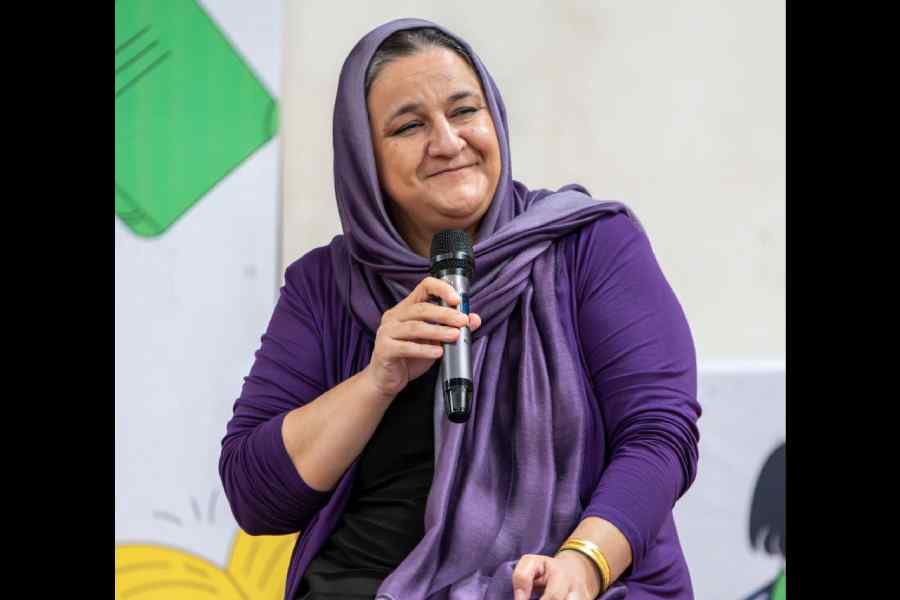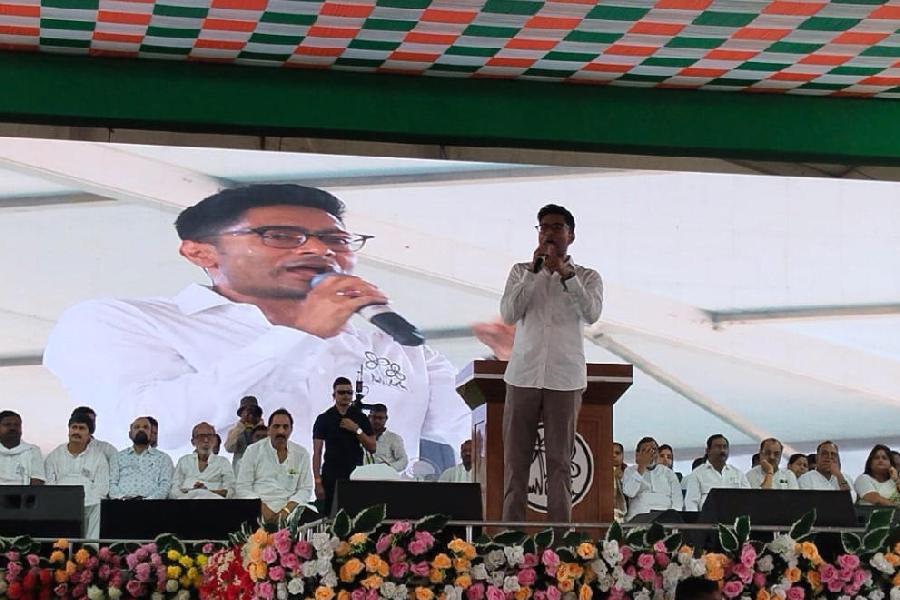A crowd seems to follow her wherever she goes. People stop her for autographs and she is delayed at every step. At the time of this interview, Rangina Hamidi, who used to be the education minister of Afghanistan before the Taliban takeover and currently teaches at a business school in the US, is in Calcutta for the Bengal Global Business Summit.
Hamidi’s first memories of Afghanistan were witnessing black smoke rising to the sky when the first Russian tank was hit by mujahideen rockets sometime in late 1979. She tells me, “Mesmerised by a black cloud rising in the sky as little kids, my younger sister and I rushed to my mother… she took us inside the room and forced us to take a nap.” In December 1979, troops from the Soviet Union entered Afghanistan, taking control of its major cities, in a bid to help the Communist party in charge there — the People’s Democratic Party of Afghanistan (PDPA) — to crush insurgency by the Afghan mujahideen. The Soviet war in Afghanistan, known as the Afghan War, raged for 10 years, killing thousands.
Hamidi’s father Ghulam Haider was serving in the ministry of finance at the time of the Communist coup in 1978. On April 27, 1978, the PDPA assassinated Mohammed Daoud Khan who was President of Afghanistan and overthrew his government in a pro-Communist coup. The minister told Haider to leave the country or else he would be killed; the Communist party had killed thousands like him. When Haider fled the country with wife Spoozmai and their seven children to Quetta in Pakistan, Hamidi was four years old. Eventually, the family moved to the US. “Because we girls could not continue our education in Pakistan as refugees,” says Hamidi.
Haider wanted to give a liberal education to his five daughters. Hamidi did a double major in religious studies and gender studies from the University of Virginia, Charlottesville. As she tells the story, she was a pre-med in the US — refugee children are encouraged to become doctors or engineers — and for her elective course she chose women’s studies. “I started reading the prescribed texts and I did not find myself in the course material.” In 1996, the world did not know of Afghan women. “It was the Taliban who made us famous worldwide,” says Hamidi.
Hamidi went to her professor who referred her to books and literature on Muslim women. She read and read, about Muslim women, about the history of Islam and other monotheistic religions, Abrahamic religions... Somewhere between all this frenetic reading she double majored in religious studies, comparative religion and gender studies.
Looking back, Hamidi says her younger self seems to have been preparing for a life in Afghanistan without knowing it. “In Afghanistan if you do not know the intricacies of how women are perceived and dealt with, and how the constant excuse used by men is religion… my educational background enabled me to question all that while I worked in Afghanistan.”
She recalls the day in August 2021 when the government in Afghanistan fell, and the Taliban Education Commission called her over to the ministry office. They wanted to know how was it that she dressed in sync with the teachings of Islam when she had been raised and educated in America. Says Hamidi, “I told them, ‘Do you think the faith or practice of Islam by an individual is confined to a geographic boundary?’”
Going further back, why did she at all respond to President Ashraf Ghani’s request to join his ministry? Her reply: “Because of his vision of de-politicising education and making it accessible to all, particularly girls.”
No matter how liberal her views, during her stint in the education ministry, Hamidi was criticised for giving in too much to the fundamentalists and appeasing hardliners in the Afghan Parliament. Her defence: “The major part of the country is conservative, it does not share the educational experience of the elites in major cities… When I had to go to the communities that had been neglected, I had to keep the conservative tradition in mind. To me that was a strategic move. But I was branded a Talib even before the Talibs came to power.”
Hamidi talks about the challenges of Afghan women, illiteracy, the state of an economy that has been at war for 45 years, the continuing violence… According to her, this context keeps the women of the country in the same place. “When you live in that environment, you stop asking questions, so traditional patriarchal norms perpetuate themselves,” she adds.
One of the reasons why Hamidi has become such a hero is because of her initial decision to stay back in Afghanistan. Nine days into the Taliban regime, however, she reversed her decision and flew out to the US. “The mother in me took over; I wanted to protect my daughter.”
But what prompted her to stay on initially? Hamidi’s reply sounds like a question. The unsaid is as important as what is said. She says, “I am a Bollywood fan, I have been inspired by Rang De Basanti… I have always been inspired by the notion of anti-colonialist, anti-imperialist history… It pained me that with more than 40 nations present in Afghanistan from 2001 to 2021 with false promises of helping the people, helping the women, helping rebuild the country, those same countries handed back Afghanistan to the elements they fought.” She pauses for breath and adds, “Is this neo-colonialism?”










